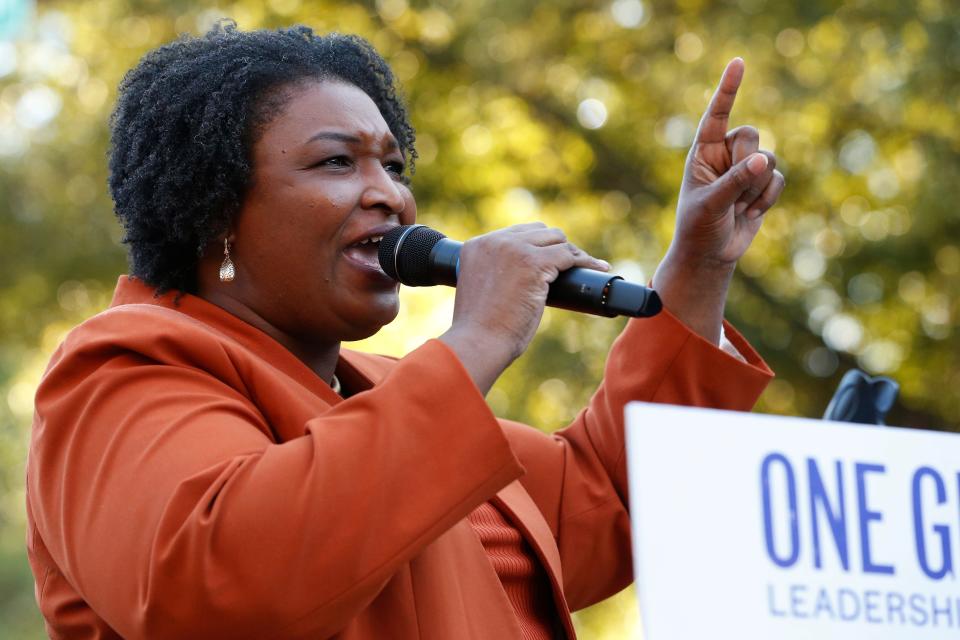Though early voting initially waned in Athens, it picked up. Why does it matter?
Advance voting in Athens-Clarke County concluded at 5 p.m. Friday. The three weeks of polling were marked by contention.
Activists and political candidates alike raised the alarm about local early voting rates falling short of the statewide average, prompting changes from the Athens-Clarke County Board of Elections.
Now that it's over, what are the key takeaways from advance voting? And what could it mean for Georgia's similarly fractious midterms?
Races to watch: Election 2022 in Georgia: Here are the midterm races to watch
Guilt by association?: Election 2022: Are Democrats 'rubber stamps" for Biden? Are Republicans 'Trump surrogates'?

A midterm slump
Early voting in Georgia opened up in October with state leaders expressing a lot of enthusiasm. Just a few days into most counties' early voting periods, Secretary of State Brad Raffensperger declared record turnout, saying the first three days of turnout were on par with the 2020 presidential election.
But in Athens, early voting began with a less fanfare. Polling locations, most of which were open from 9 a.m. to 5 p.m., consistently collected between 600 to 700 ballots each day. But when the numbers began to slump in the second week, politicians and activists began to show some concern.
On Oct. 25, Mayor Kelly Girtz and Athens-Clarke County Commissioner Tim Denson announced a press conference in advance of the Board of Elections meeting. (The press conference was later canceled when the Board of Elections meeting was moved). UGA student organizations, like UGA Votes and the Davenport-Benham Black Law Student Association, pointed out Athens-Clarke County's comparatively low early voting rates.
Barriers: Barriers to the ballot: Georgia voters with disabilities working to improve access to the polls
Debate: Kemp, Abrams spar over abortion, gun violence in second Georgia governor's debate

After rescheduling its meeting from Oct. 25 to Oct. 26, the Board of Elections voted to expand early voting hours at three locations. Each of the three polling stations would now be open from 7 a.m. to 7 p.m. on select days.
Early voting turnout picked up significantly in the third week, with more than 2,000 people casting their ballots each day. But it's hard to say whether expanding voting hours did the trick.
Charles Bullock, professor of political science at the University of Georgia, said that polls tend to see spikes of interest rather than consistent rates.
"Usually, the pattern is that you have a real burst of activity in the very beginning," he said. "And then, like with everything else, people put off voting to the last day. The last couple of days, it's usually very heavy."
All told, Athens-Clarke County tallied 22,154 votes cast during the early voting period.
Why vote early?
Gubernatorial candidate Stacey Abrams paid a visit to College Square in the first week of early voting. Guest speakers, aides and Abrams herself all asked supporters to not only vote, but vote early. Why?
"Both parties like to get people to vote early because that way, you know you've got their votes," Bullock said.
Democrats and Republicans alike like to get a jump on voting in order to see what the results may look like before election night rolls around. Although it doesn't necessarily provide a complete look; Bullock explained that Democrats tend to vote early and Republicans tend to vote on Election Day or through absentee ballots.

"But that all got distorted with COVID, when so many people were voting absentee," he said.
Charlotte Sosebee, the director of elections and voter registration in Athens-Clarke County, said the early voting period also ensures people can cast their ballot even if life gets in the way.
"Let's say for instance, there's a unforeseen emergency that comes up at the end of early voting Saturday. Something comes up and it requires you to be out of town, and then you can't vote on Monday, and you're gonna be out of town Tuesday. You've missed your opportunity to vote in the election," she said. "It's best to get it done early."
The final count
Election Day is tomorrow. For Sosebee, it's one of the most hectic days of the year. But it's also one of the most exciting, particularly for first-time voters, whom she's seen a lot of this year.
"The reason I know that is because we believe in celebrating our first-time voters. We will ring the bell or the ladies running the advance voting here in the office will all kind of holler," she said.
Georgia has just under 8 million registered voters, with about 7 million of those voters listed as active. During the early voting period, 2,289,502 Georgians cast their ballots in the midterm election. The Athens area contributed over 22,000 of those votes.
The numbers are down from 2020, but for a midterm year in Georgia, it's still nothing to sneeze at.
"I'm very impressed with that, you know, that our voters are determined regardless of how many drop boxes or locations we have," Sosebee said.
This article originally appeared on Athens Banner-Herald: Athens voters started off slow to the polls for advance voting

